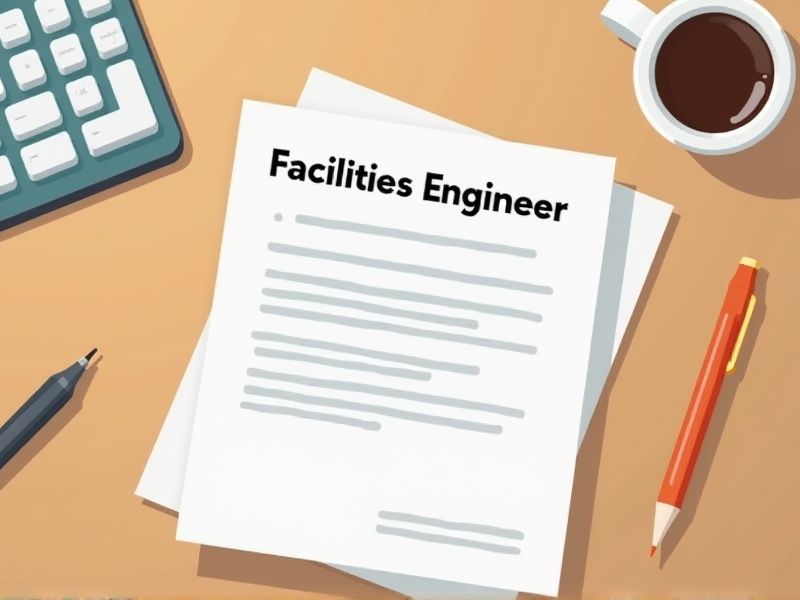
In the field of facilities engineering, certifications serve to validate expertise and ensure adherence to industry standards. Earning certifications equips engineers with the latest technical knowledge, enabling them to effectively manage complex building systems and maintenance protocols. These credentials also enhance career opportunities and marketability by demonstrating commitment to professional growth. Here are some important certifications you may need as a Facilities Engineer.
Certified Facility Manager (CFM)
Certified Facility Managers (CFMs) provide validation of expertise, which can bolster a Facilities Engineer's credibility. The extensive training and certification process equips CFMs with advanced problem-solving skills, enhancing operational efficiency in facility management. CFMs bring a strategic approach to facility operations that aligns with organizational goals, supporting Engineers in resource planning and management. Engaging CFMs helps Facilities Engineers navigate compliance and regulatory challenges effectively, reducing potential legal and operational risks.
Facility Management Professional (FMP)
A Facility Management Professional (FMP) provides a structured framework that enhances a Facilities Engineer's ability to manage complex building systems efficiently. The FMP credentials ensure facilities engineers stay updated on best practices, ensuring smooth operations and maintenance. By integrating FMP knowledge, engineers can optimize energy usage and reduce the overall carbon footprint of a facility. The certification strengthens skills in budgeting and resource allocation, leading to cost-effective facility management.
Sustainability Facility Professional (SFP)
Facilities Engineers face increasing pressure to manage buildings in an environmentally responsible way; acquiring the Sustainability Facility Professional (SFP) credential equips them with the knowledge to implement sustainable practices that reduce waste and energy consumption. The credential helps Facilities Engineers identify and integrate cost-effective green solutions, reducing operational costs and promoting tenant and community health. Growing regulatory requirements around sustainability necessitate expertise that SFP training provides, ensuring compliance and competitive advantage. As companies increasingly prioritize sustainability, having an SFP differentiates engineers and aligns their skillsets with industry demands.
LEED Accredited Professional (LEED AP)
Having a LEED Accredited Professional (LEED AP) as a Facilities Engineer can enhance sustainable building practices, resulting in reduced operational costs and environmental impact. Knowledge in LEED certification helps ensure buildings comply with green standards, attracting eco-conscious tenants and stakeholders. Expertise in LEED can guide the engineer in implementing innovative energy-saving techniques. As companies prioritize sustainability, a LEED AP credential distinguishes professionals in competitive job markets.
Certified Energy Manager (CEM)
A Certified Energy Manager provides expertise in reducing operational energy costs, enhancing a facility's financial performance. Facilities Engineers benefit from CEMs by gaining strategies to improve energy efficiency, aligning with sustainability goals. Regulatory pressures demand compliance with energy standards, which CEMs are equipped to navigate. CEMs offer insights that lead to innovative engineering solutions, fostering a competitive edge in facility management.
Building Operator Certification (BOC)
Facilities engineers often handle complex building systems. A Building Operator Certification provides the necessary expertise in energy efficiency and sustainable practices, addressing key areas like HVAC operations. Certified engineers typically lead to reduced operational costs due to optimized systems management. BOC also enhances a facility's compliance with environmental regulations, reducing legal and operational risks.
Project Management Professional (PMP)
Project Management Professional (PMP) certification provides a Facilities Engineer with structured project management skills, leading to more efficient project executions. It enhances their capability to align with organizational goals through standardized practices, improving operational efficiency. PMP-certified Facilities Engineers often experience increased credibility and recognition, which can result in better career advancement opportunities. The certification also supports risk management proficiency, helping engineers minimize project disruptions and optimize resource allocation.
Certified Maintenance & Reliability Professional (CMRP)
Certified Maintenance & Reliability Professional (CMRP) certification provides facilities engineers with a structured understanding of maintenance best practices, leading to improved equipment reliability. It fosters a standardized approach, reducing operational downtime and yielding cost savings. By adopting CMRP methodologies, facilities engineers enhance predictive maintenance capabilities, reducing unexpected failures. As reliability of systems increases, customer satisfaction and safety standards also see significant improvements.
OSHA 30-Hour Construction Safety Certification
Facilities engineers need OSHA 30-Hour Construction Safety Certification because it ensures they understand essential safety protocols, reducing on-site accidents and injuries. The certification provides knowledge on hazard identification, crucial for maintaining a safe working environment. Understanding OSHA standards aids facilities engineers in complying with legal requirements, avoiding potential fines or legal issues. Enhanced safety awareness from the certification contributes to more efficient project management and effective safety plans.
Six Sigma Green Belt
The implementation of Six Sigma Green Belt principles allows Facilities Engineers to efficiently reduce operational inefficiencies, which typically results in lower maintenance costs. Facilities Engineers equipped with Six Sigma training can systematically identify and eliminate defects in processes, enhancing overall reliability and safety within facilities. Mastery of Six Sigma methodologies enables engineers to optimize resource allocation, leading to improved sustainability and energy efficiency. Facilities Engineers with Six Sigma expertise often contribute to better stakeholder satisfaction through consistent improvements in service quality and delivery time.
Summary
By obtaining certifications, you enhance your marketability and gain a competitive edge in the job market. This credentialing process often leads to increased credibility among peers and management, resulting in more challenging project assignments. With specialized knowledge, you likely achieve more efficient problem-solving and innovative solutions. Over time, certifications can also contribute to better salary prospects and career advancement opportunities.
